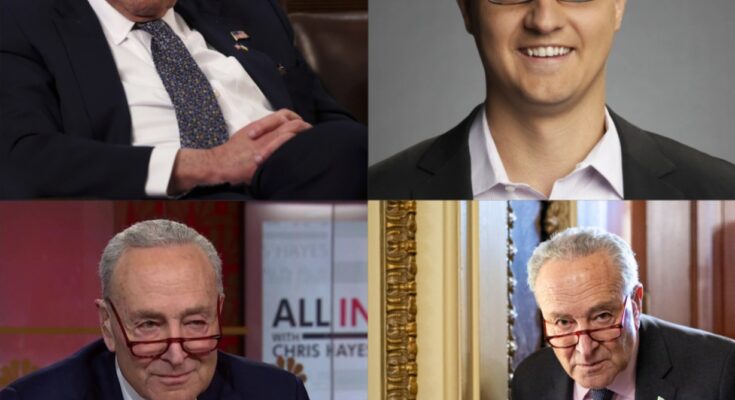
In a recent episode of MSNBC’s “All In With Chris Hayes,” tensions reached a boiling point when host Chris Hayes openly expressed his disappointment with Senate Minority Leader Chuck Schumer. The heated exchange unfolded as Schumer faced substantial criticism for his decision not to push for a government shutdown over a budget resolution linked to President Trump. During the broadcast, Hayes confronted Schumer, prompting a significant discussion about the Democratic Party’s strategy as they navigate an increasingly complex political landscape.
Chris Hayes Challenges Schumer’s Political Strategy

As the segment progressed, Hayes took a direct approach, questioning Schumer about the Democratic Party’s plan to effectively address the challenges posed by the Republican agenda. Hayes’s frustration stemmed from what he perceives as a lack of decisive action from Democratic leadership. Schumer defended his decisions, expressing confidence that the party is working diligently to mobilize the Senate and build a more formidable opposition. He emphasized that it’s crucial for the Democrats to wait for the right moment to counter Republican policies effectively.
Schumer argued that the current political climate doesn’t necessarily warrant a drastic response. He pointed to shifts in Trump’s approval ratings, suggesting that sustained efforts would eventually yield positive results for the Democratic Party and lessen the former president’s influence on American politics. Hayes, however, remained skeptical, pressing Schumer on how such a strategy translates into tangible actions that address pressing issues.
The Broader Political Context and Implications

This moment not only highlighted internal tensions within the party, but it also underscored the evolving dynamics of American politics as the midterm elections approach. There are growing concerns among constituents about the effectiveness of Democratic leadership in countering key Republican initiatives. Many Democrats are worried about maintaining public support and reinforcing their legislative agenda against a backdrop of economic uncertainty and heightened partisan divisions.
Schumer’s stance reflects a broader debate within the Democratic Party. While some members support a more aggressive approach, a faction believes in the importance of strategic patience. They argue that overreacting to Republican maneuvers might backfire. However, Hayes’s frustration encapsulates the concerns of many voters who feel that the Democratic leadership needs to capitalize on opportunities for change rather than waiting for favorable circumstances to present themselves.
Public Sentiment and its Impact on Legislative Strategies

Public sentiment plays a critical role in shaping the strategies employed by party leaders. As Hayes articulated during the segment, the disconnect between the leadership and the electorate could lead to missed opportunities for the Democrats. Voter frustrations and expectations for tangible action have never been higher, and it’s vital for the party to adapt quickly to the evolving demands of its base.
Moreover, with the Republican Party remaining resolute in their messaging and action, Democrats face an uphill battle in establishing a counter-narrative. Schumer’s reassurances about future success are met with skepticism by some party members who demand immediate and more aggressive responses. The effectiveness of the Democratic strategy will ultimately be measured by their ability to galvanize support and achieve legislative victories in a time of heightened challenges.
In conclusion, the exchange between Chris Hayes and Chuck Schumer on MSNBC not only revealed underlying frustrations with the Democratic strategy but also highlighted critical dilemmas that may define the party’s future trajectory. As voters look for commitment and action from their leaders, it is evident that the political landscape is more dynamic and challenging than ever before. To learn more about this intricate political exchange and its implications, stay informed by following MSNBC and engaging with political commentary that shapes our understanding of current events.




